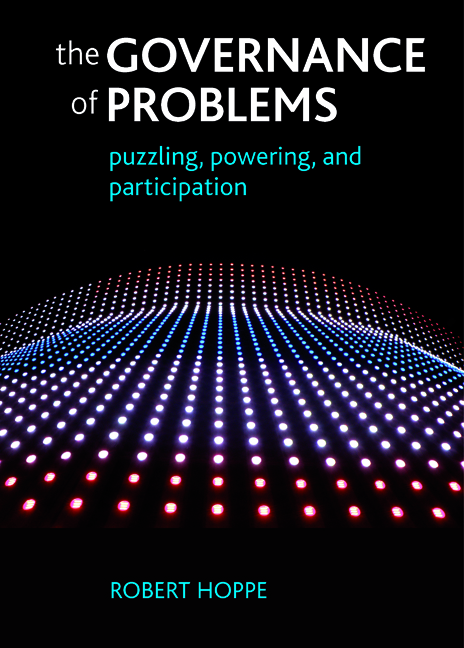Book contents
- Frontmatter
- Dedication
- Contents
- List of boxes, figures and tables
- About the author
- Preface
- one A problem-processing perspective on governance
- two The governance of problems: a map
- three Analysing policy problems: a problem-structuring approach
- four Cultures of public policy problems
- five Problem types and types of policy politics
- six Problem-structuring dynamics and meta-governance
- seven Making policy analysis doable and reflexive
- eight The plural democracies of problems: a meta-theory
- nine Public engagement and deliberative designs
- ten Responsible and hopeful governance of problems
- Bibliography
- Index
seven - Making policy analysis doable and reflexive
Published online by Cambridge University Press: 01 September 2022
- Frontmatter
- Dedication
- Contents
- List of boxes, figures and tables
- About the author
- Preface
- one A problem-processing perspective on governance
- two The governance of problems: a map
- three Analysing policy problems: a problem-structuring approach
- four Cultures of public policy problems
- five Problem types and types of policy politics
- six Problem-structuring dynamics and meta-governance
- seven Making policy analysis doable and reflexive
- eight The plural democracies of problems: a meta-theory
- nine Public engagement and deliberative designs
- ten Responsible and hopeful governance of problems
- Bibliography
- Index
Summary
Scientific method is one important way to make sense of some bits of human experience, useful where applicable, potentially disastrous when it is used in an attempt to monopolize discourse. By recognizing the essentially political purpose of scientific method, we will be better able to evaluate its contributions and its limits in creating and sustaining communities of shared meaning. (Sederberg, 1984: 43)
Introduction
Chapters Three through Six dealt with the transition dynamics of the relation between policy designs and the socio-political contexts of cultures and policy networks. Now the focus moves to the realms of framing and design dynamics in the knowledge context of designing policies (see Figure 2.4, Chapter Two).
This knowledge context is made up of three elements:
• citizens’ and civic associations’ experiential constructions of knowledge deemed relevant for interpreting what policies mean to them;
• the knowledge constructions of practitioners with active roles in policy networks; and
• the constructions of those who deal in a scientific way with problems and policies.
Of course, the knowledge context is a ‘trialogue’ between these three types of constructions; they all mutually influence each other. The approach to this intertwined system of knowledge constructions will start from the lens of the scientific constructions; more particularly, with how academic and professional policy analysts have proposed to deal with scientific knowledge constructions methodically and systematically in designing and evaluating public policies.
Policy analysts first thought that they could legitimately limit themselves to consideration of scientific constructions only. This original position is summarised in Wildavsky's (1980 [1979]) aphorism for policy analysis as ‘speaking truth to power’. In later developments, this original position was thoroughly criticised. Academic policy analysis acknowledged the poverty of its original position, and the necessity of including practitioners’ and experiential knowledge accounts into the problem framings underlying the designs and evaluations of public policies. This new position suggests that policy analysis is ‘making sense together’ all the way down (Hoppe, 1999). Yet, the protagonists of ‘making sense together’ all too often advocate different scientific theories and methodologies for its achievement. To the extent that they are interested in research of how policy analysis is actually done, they select cases that may easily be interpreted in terms of their own methodological and conceptual preferences (Hajer and Wagenaar, 2003: 33-112).
- Type
- Chapter
- Information
- The Governance of ProblemsPuzzling, Powering and Participation, pp. 167 - 194Publisher: Bristol University PressPrint publication year: 2010

